Adicionar o sistema de comentários Disqus é uma ótima maneira de superar as limitações do sistema de comentários padrão do WordPress.
Eis o motivo: o gerenciamento de comentários em um site do WordPress pode se tornar rapidamente uma tarefa árdua, especialmente com spam entupindo seu painel. Embora o sistema padrão funcione, ele carece de ferramentas avançadas de moderação e de recursos interativos que promovam um envolvimento significativo.
O Disqus é uma das plataformas de comentários mais populares, oferecendo uma interface elegante, discussões em tópicos e opções de login em mídias sociais.
Neste guia, mostraremos uma maneira fácil de adicionar o Disqus ao seu site WordPress.

Você deve usar o Disqus no WordPress?
O Disqus é um dos sistemas de comentários de terceiros mais populares disponíveis para usuários do WordPress. Além da facilidade de uso e das opções de personalização, ele também oferece uma plataforma de hospedagem de terceiros para armazenar e gerenciar comentários.
Como o Disqus processa os comentários em um servidor separado da hospedagem do WordPress, usá-lo pode ajudar no desempenho geral do seu site. É por isso que muitos usuários do WordPress o utilizam como uma alternativa ao sistema de comentários padrão do WordPress.
Dito isso, o Disqus não é o melhor sistema de comentários que já experimentamos. Embora tenha ajudado no desempenho de nosso site, não gostamos muito de seus recursos de moderação e ele adicionou links de afiliados ao nosso conteúdo sem nossa permissão.
Depois de desativar o Disqus, vimos nossa taxa de engajamento nos comentários aumentar significativamente. Você pode ler mais sobre nossa experiência em nossa análise do Disqus.
É claro que a decisão de usar o Disqus ou outras plataformas é sua. Mas se estiver procurando alternativas ao Disqus, temos algumas recomendações.
Que sistema de comentários do WordPress você deve usar em vez do Disqus?
Depois de experimentar diferentes plug-ins de comentários, descobrimos que o Thrive Comments é a melhor alternativa ao Disqus.
O Thrive Comments é um plug-in de comentários tudo-em-um com uma interface fácil de usar, perfeita para iniciantes e especialistas em blogs. Para obter mais detalhes, consulte nossa análise do pacote Thrive Themes, que contém uma seção específica sobre o Thrive Comments.

Além dos recursos de gerenciamento e moderação de comentários, você pode usar o Thrive Comments para aumentar o envolvimento do usuário com ações pós-comentário. Depois que o usuário deixar um comentário, você poderá redirecioná-lo para publicações relacionadas ou para uma mensagem de agradecimento personalizada com um brinde.
Além disso, é possível adicionar curtidas e não cur tidas, bem como votos positivos e negativos para incentivar a interação do público na seção de comentários. Além disso, você pode enviar notificações aos comentaristas quando seus comentários forem respondidos.
Se o Thrive Comments não atender às suas necessidades, confira também nossa lista completa dos melhores plug-ins do WordPress para melhorar os comentários.
Se você ainda estiver interessado em usar o Disqus, não se preocupe. Nós o orientaremos sobre como adicionar o plug-in do sistema de comentários Disqus. Você pode usar os links rápidos para pular para diferentes seções:
Vamos direto ao assunto!
Etapa 1: Criar uma conta Disqus
A primeira etapa para instalar os comentários do Disqus no WordPress é criar uma conta do Disqus. Para isso, você precisa acessar o site do Disqus(disqus.com) e se inscrever.
Depois de fazer isso, você verá a página abaixo. Vá em frente e clique em ‘I want to install Disqus on my site’.
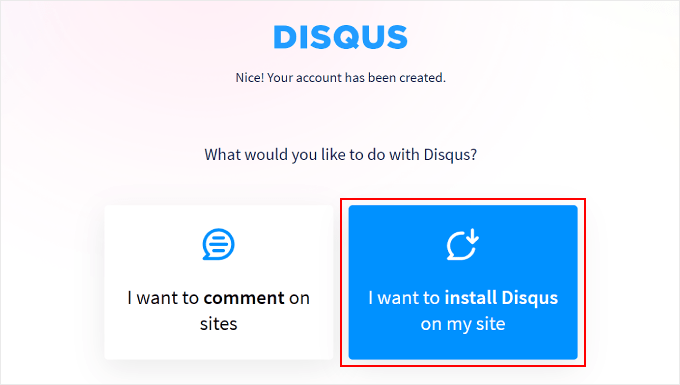
Na próxima página, você terá que adicionar os detalhes do seu novo site do Disqus, que é onde você gerenciará todos os seus comentários do Disqus. Esses detalhes incluem o proprietário do site, o nome do site e a categoria.
No campo “Website Name” (Nome do site), você pode inserir o subdomínio do site Disqus desejado. Depois disso, basta clicar em “Create Site”.
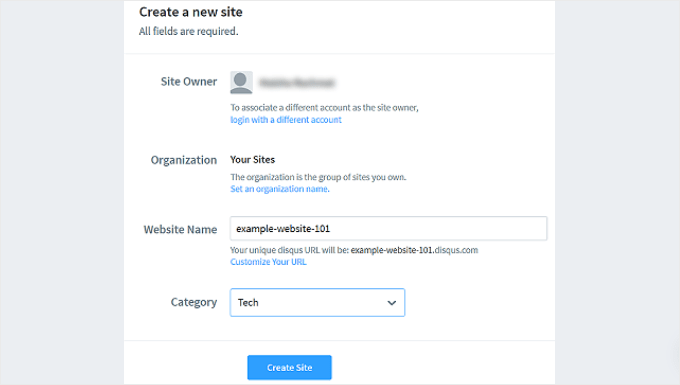
Agora você chegará ao painel do site do Disqus.
Nesse ponto, você precisará escolher um dos planos do Disqus para poder configurar o sistema de comentários no WordPress. Se ainda não tiver certeza de qual deles usar, você pode começar com o plano Basic gratuito.

Agora você será solicitado a escolher uma plataforma.
Basta selecionar “WordPress” para continuar.
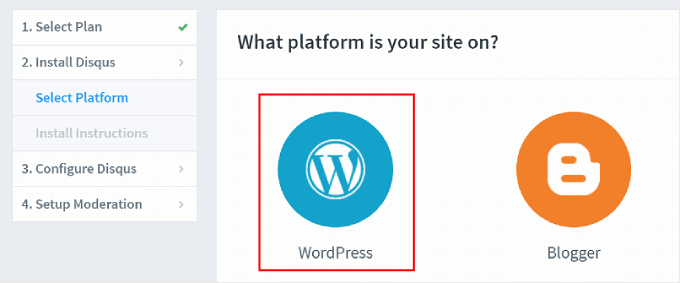
Agora você verá a página de instalação do WordPress.
Aqui, você deve anotar o campo “Installation Token”, que será útil para a configuração posterior.
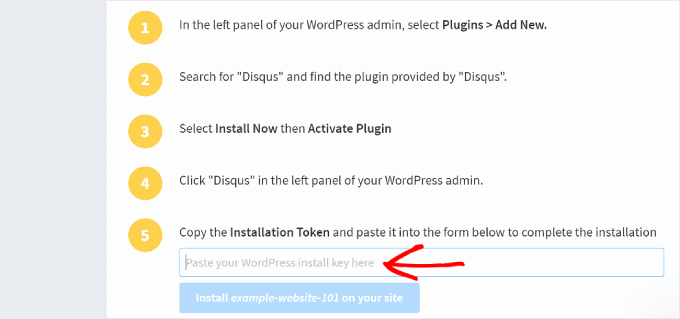
Você pode deixar essa guia aberta enquanto continua com as próximas etapas.
Etapa 2: Instale o plug-in do sistema de comentários Disqus
Agora, você pode abrir o painel do WordPress para instalar o plug-in Disqus Comment System. Para obter instruções passo a passo, consulte nosso guia sobre como instalar um plug-in do WordPress.
Depois disso, vamos acessar o menu Disqus em seu painel do WordPress. Em seguida, em “Do you have a Disqus account?” (Você tem uma conta Disqus?), basta clicar em “Yes” (Sim).
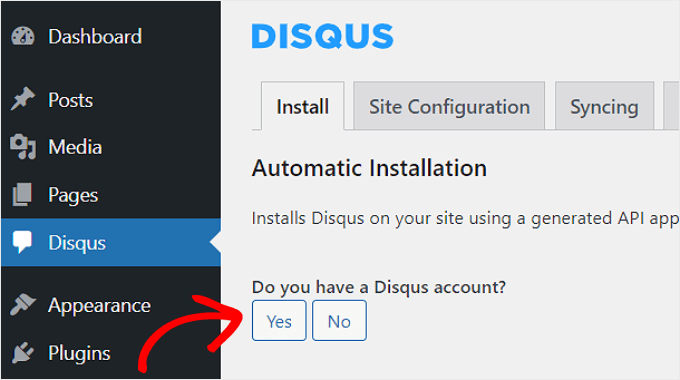
Agora você verá a pergunta: “Você tem um site registrado no Disqus que deseja usar?”.
Vá em frente e selecione “Sim”.
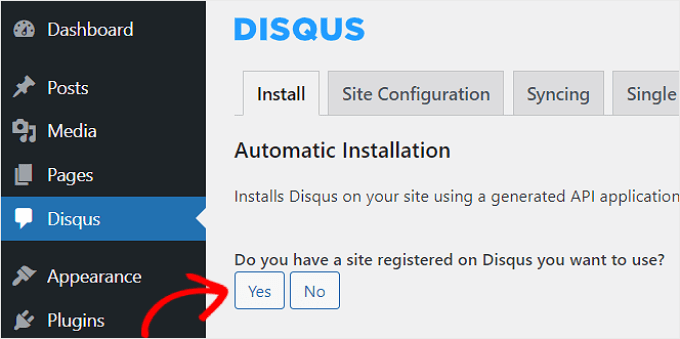
Nesse ponto, você verá algumas instruções de instalação do WordPress e um token de sincronização para copiar.
Clique no botão “Copiar” aqui.
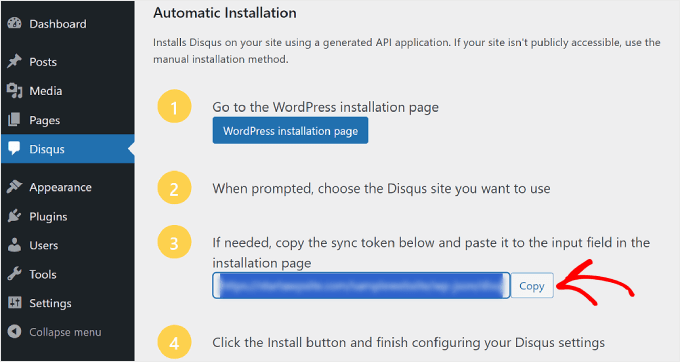
Vamos voltar ao site da Disqus.
Aqui, você precisará colar o token que acabou de copiar do painel do WordPress no campo apropriado.
Em seguida, você pode clicar no botão “Install [Disqus site name] on your site” (Instalar [nome do site Disqus] em seu site) e clicar em “Configure” (Configurar) na parte inferior.
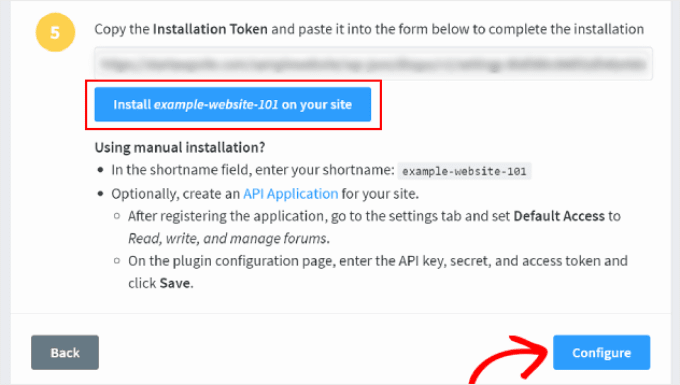
E é isso!
Se você atualizar o menu Disqus no painel do WordPress, deverá ver uma interface semelhante a esta:
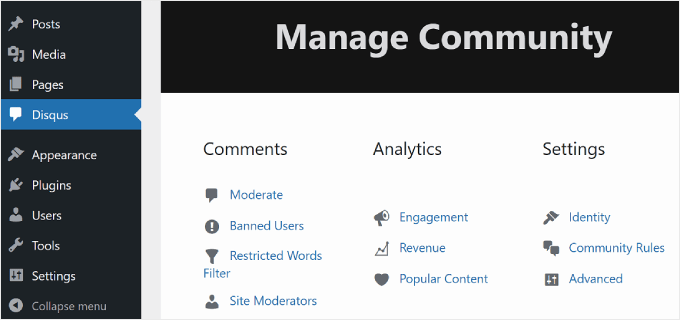
Agora, vamos ver se o Disqus foi ativado com êxito na sua seção de comentários.
Basta abrir uma postagem de blog do WordPress no front end e rolar para baixo até os comentários. Esta é a aparência que deve ter se a instalação foi feita corretamente:
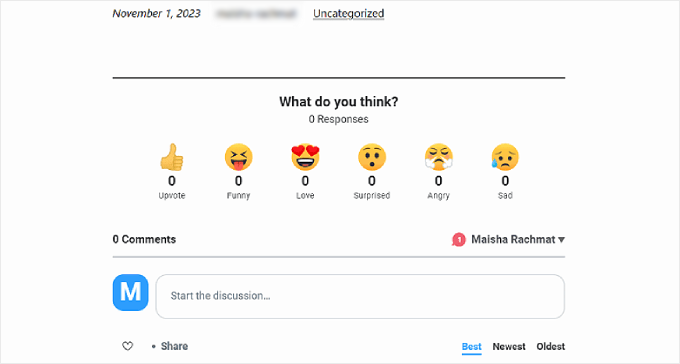
Etapa 3: Importar e exportar comentários antigos do WordPress para o Disqus
Depois de instalar o sistema de comentários Disqus, ele substituirá os comentários nativos do WordPress em seu site. Em outras palavras, os comentários existentes armazenados no seu site do WordPress não ficarão visíveis para os usuários.
Para corrigir isso, você terá que importar todos os comentários existentes para o sistema de comentários do Disqus. Na área de administração do WordPress, vá para a página de configurações do plug-in Disqus, role para baixo e navegue até a guia “Syncing” (Sincronização).
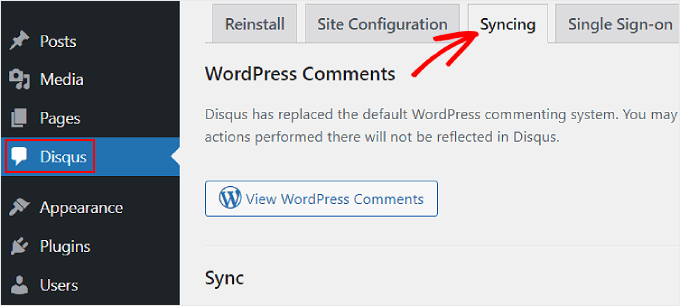
Em seguida, role a tela para baixo e selecione “Import Comments” (Importar comentários).
Você verá quais dos seus comentários foram importados com sucesso na tabela na parte inferior.
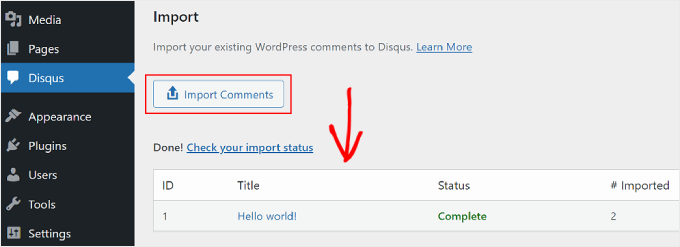
Um aspecto a ser observado é que, se você tiver tipos de postagem personalizados, poderá notar que os comentários mais antigos não estão aparecendo após a mudança para o Disqus. Para resolver isso, você precisará desativar o Disqus nos tipos de postagem personalizados.
Para obter orientação prática, consulte nosso artigo sobre como desativar o Disqus em tipos de post personalizados.
Como moderar e configurar os comentários do Disqus
Se quiser moderar os comentários usando o Disqus, você pode clicar no botão “Moderate” (Moderar) na página do plug-in do Disqus.
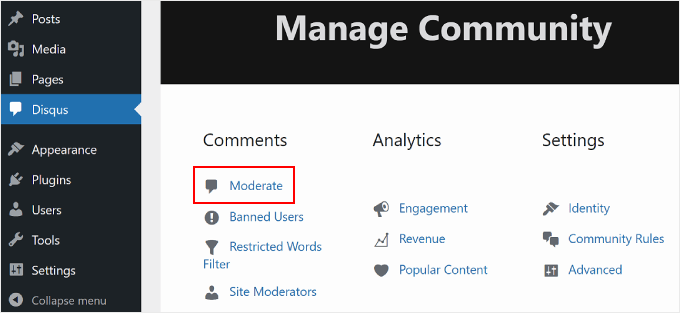
Isso o levará à página de moderação no site do Disqus.
Se você estiver familiarizado com a página de comentários do WordPress, navegar pela página do Disqus não será um problema. Aqui, você pode aprovar, excluir ou marcar comentários como spam.
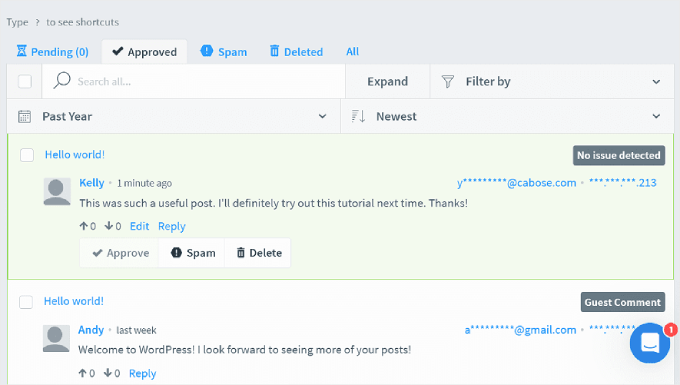
Para obter dicas e truques sobre a moderação de comentários no WordPress, consulte os artigos a seguir:
- Guia para iniciantes sobre como moderar comentários no WordPress
- Como permitir que os usuários do blog moderem comentários no WordPress
- Como permitir que os usuários editem seus comentários no WordPress
Como solucionar o problema de exibição de comentários do Disqus
Em alguns temas do WordPress, a área de comentários do Disqus pode parecer mais larga do que o restante da área da postagem. Para corrigir isso, você precisará adicionar algum CSS personalizado à folha de estilo do seu tema ou tema filho.
Embora você possa adicionar CSS personalizado por meio do editor de arquivos do tema, não recomendamos isso. O rastreamento das alterações se torna complicado, fazendo com que não fique claro qual código é do tema e qual é personalizado.
Em vez disso, sugerimos usar o WPCode, que é o plugin de trechos de código mais fácil. Ele permite adicionar e gerenciar com segurança códigos personalizados em seu site WordPress. Se o código não funcionar, você poderá remover facilmente o snippet dentro do plug-in.
O código que você precisará adicionar está abaixo:
1 2 3 4 | #disqus_thread { margin: 0 auto; max-width: 650px;} |
Esse CSS define a largura máxima da área de comentários como 650px e a centraliza na tela. Seu tema pode ter uma largura diferente, portanto, será necessário ajustá-lo para atender às suas necessidades.
Para obter um tutorial passo a passo, você pode ler nosso guia sobre como adicionar facilmente CSS personalizado ao seu site WordPress.
Esta é a aparência que deve ter no WPCode:
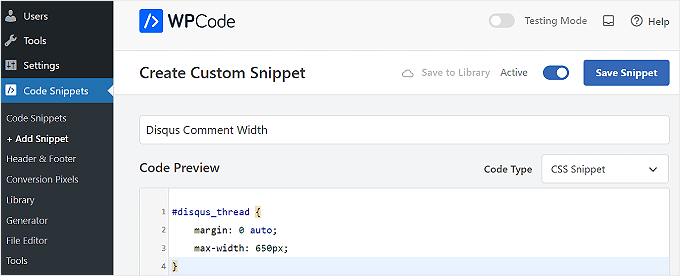
Saiba mais maneiras de gerenciar seus comentários no WordPress
Usar o Disqus é apenas uma maneira de gerenciar seus comentários no WordPress. Aqui estão mais guias que você pode consultar para melhorar o envolvimento com os comentários:
- Como permitir que os usuários denunciem comentários inadequados no WordPress
- Como instalar e configurar comentários do Facebook no WordPress
- Como paginar comentários no WordPress (passo a passo)
- Como adicionar vídeos e muito mais nos comentários do WordPress com o oEmbed
- Como permitir que os usuários editem seus comentários no WordPress
- Como estilizar o formulário de comentários do WordPress (guia definitivo)
- Como enviar um e-mail de agradecimento aos comentaristas do blog no WordPress
Esperamos que este artigo tenha ajudado você a aprender como adicionar o sistema de comentários Disqus no WordPress. Você também pode conferir nosso guia sobre como destacar ou ocultar comentários no WordPress e nossas escolhas de especialistas para os melhores plug-ins para melhorar os comentários do WordPress.
Se você gostou deste artigo, inscreva-se em nosso canal do YouTube para receber tutoriais em vídeo sobre o WordPress. Você também pode nos encontrar no Twitter e no Facebook.





Aaron Jane
Hello,
I’m getting lot of spams on my site with the default comment system, though I have akismet installed. Thought about using Disqus, but I see that Disqus is no longer used by wpbeginner. Can you share why you moved away from disqus ?
Thanks Aaron.
WPBeginner Support
Here is why we switched away from Disqus.
Admin
Theo
Thanks a whole lot for this post. I’ve decided to start using disqus for some of the same reasons you mentioned here. This was helpful!
Mohammed Haseeb
Okay. I know Disqus is good but I have a question. Is there a way to remove hyperlinks from profile names of people commenting on my blog posts. Here is the link to my blog
AlleXyS
Hello … I tried some days to activate disqus on my website. CAN’T , due of a issue in database…. I install disqus (plugin) => comments => disqus => tell me to upgrade my DATABASE !! I click UPGRADE, but nothing happening, my website tell me that this page can’t be found .. So, I think the script can’t run
here I can’t arrive : http://cdn2.wpbeginner.com/wp-content/uploads/2014/04/disqus-signin.png
WPBeginner Support
Please contact Disqus support they would be better able to help you with that.
Admin
WPBeginner Staff
Disqus.
Adjie Al-Faruq
how to fix “unable to connect to the disqus api servers”
Bora M. Deniz
Hi, very simple expression and useful article. I’m between jetpack plugin and disqus system .Which one is the more useful for visitors and further SEO of website ?
Santhosh Veer
when i try to import the worpdress comments i show error please help me to fix this
Andreia Franco
I have disqus on my blog for a couple of months, since then I just have received lots of spams and disqus doesn’t work at all. I see disqus on other wordpress blogs and it seem to work very well. I do not know what to do with mine. I always go back to moderate and try to activate it but it doesn’t work, still. Do you have any suggestions?
couture31
SOOO glad to have you all as a resource! I have transitioned to a self-hosted WP site and I visit your site daily for tips! Thanks for your help and patience…the step by step directions are awesome!! So grateful!
WPBeginner Staff
Edit the post and make sure comments are enabled for that post. Also go to Settings > Discussion and make sure that the box next to ‘Automatically close comments on articles older __ days’ is unchecked.
UgochukwuEmmanuelAgbams
Thanks for this tutorial. I have earlier registered on disqus, installed and activated the plugin, but ny problem now is, at the footer of my blog post after disqus, I have a report that says, ‘comments are closed’, and another issue is, disqus does not sync with my loged in users. What should I do about this?
Kerryvaaine
It is available as a plugin in wordpress.
Neal Umphred
My experience trying to get Disqus onto my site does not resemble anything like what you have written above. It’s an hour later and I can’t get anything happening . . .
Teresa Robeson
I sympathize because it is the same for me. There is no “plugins” link on my admin page, nor is there any option for adding Disqus (or anything else) under the Comments link. Maybe it’s because I’ve only got a free WP site, but I didn’t have this much trouble installing Disqus on my Blogger site. There are days I really hate WordPress.
I hope you got it figured out since you posted 2 weeks ago.
Dennis
I personally have used jetpack comments for comment on site to handle spam. Most persons I have noticed are usually uncommon with the disqus concepts and dislike the sign up process, very few notice the ‘guest’ option. But I’m looking into using Vanilla comments by integrating vanilla forums into my wordpress website and keep the comment actions completely under my control simples like a good option to me so far from testing.
Aaron Aarons
I don’t have my own blog but I regularly post comments to blogs that use Disqus. Quite frankly, there is so much I dislike about Disqus that I would never use it, without major future improvements, in a blog I had any control over.
1) Comments either don’t show up at all in Google searches on phrases within them, or they show up as part of the page of the particular commenter’s Disqus comments, rather than as part of the page they comment on.
2) If I save a web page that has Disqus comments, the comments are not saved with the page, and the ability to retrieve the comments depends on the future maintenance of such comment threads by Disqus.
3) I can save a page with comments as a PDF, but then the information about the precise date and time of a comment can no longer be seen even by a mouse-over (nor by looking at the non-existent source), so all one sees is how many days, weeks, months or years before the time the page was saved the comment was posted. This makes it impossible to follow the chronology of a discussion.
4) In one case, a blogger lost his domain name and had to get a new, different one. Since then, the old pages can be accessed with the new domain name, but the old comments do not show. There is a way to get to the original comment thread, but it’s not accessible to the casual user.
There are other, less serious, annoyances, that have slipped my mind for the moment.
If I am wrong about any of the items I had listed as problems above, I’d like to know.
Earl Henson
I wonder if Google traffic is lower than it would be if comments don’t show in Google? And of course comments would be the same with Disqus but wouldn’t they become higher over time as more people discover this blog? But if NEW users can’t discover this blog because the comments are not Google searchable…..
Codex73
Recently installed “Disqus Comment System” WordPress plugin, it displays correctly and accepts comments. When I reply through the Dashboard, these won’t show on thread. Should replies be handled directly in the Disqus thread instead?
Bricky
Is there a way to display a number in front of each comment using disqus?
Metal Mofos
What about SEO?
Dave
Even with Disqus, the comments are fully indexed along with the page. Do a View Source of this page to see for yourself.
Rob Orr
That’s not necessarily true. It’s possible that Google will index your comments, but I’ve seen many more that are not indexed as opposed to those that are.
WPBeginner Staff
We wrote about this plugin in our guide on how to add Google+ comments in WordPress.
Animish
Thanks for this useful article. But there is one question stuck in my mind. Does Disqus affect the load time of posts? Because it uses iframe to load comments. Didi you notice any difference?
Jeanz
Hello Syed. What you think about this plugin? – WordPress Comments Evolved – that allow to display G+ comments, FB comments, WordPress and Disqus. I can’t find any useful review in google search, thanks
Mehmet Fatih Yorulmaz
I have two problems about Disqus (which I already use):
First, it does not allow me to convert my commenters to subscribers by adding a checkbox to the bottom of the comment box. Normally, I was using Mailchimp Comment Optin plugin for this. Also, it does not work with “Comment Redirect by Yoast” plugin…
Second problem is, Subscribe button is difficult to notice for inexperienced commenters. In wordpress comment box, the simple checkbox for subscribing to the replies was very easy to notice. Also, guest commenters are by default subscribed to all comments. And they are not given option to subscribe to “only replies”. Last, but not least, the word “subscribe” is very ambigious. What is it? Subscribe to my site, subscribe to my newsletter or subscribe to the comments?…
Third issue is, language support. My site is in Turkish and I can select Disqus interface to be in Turkish. But, when my not English speaking visitor hits “Subscribe”, they are sent an English confirmation email. Or when they wanna edit their subscription preferences, again they are being forwarded to an all Engish page.
I appreciate your thoughts on these issues…
Thanks
WPBeginner Staff
Manuel, we haven’t noticed any decline in the number of comments we receive on WPBeginner.
Manuel Echeverry
its true but there a some WP pages that claim that have to disable disqus because the visitors dint like it. I personaly use Disqus in my site and have no bat experiences until now, but its something that we have to pay attention
Manuel Echeverry
I love disqus but the are some people that claim is hard to use por the blog visitors making you lose commenters, wath do you know about that
WPBeginner Staff
No actually the number of comments is nearly the same as before. There is less spam though.
Gagan Masoun
Now, you are also getting too many comments after adding Disqus comment system…
khoaplus
Disqus can not be integrated with CommentLuv
Muhammad Tahir
Thanks your articles are awesome
Golam Rabbani
I am going to add disqus in my blog. I think it can help me to avoid spaming comment. Thanks for your nice tips.
WPBeginner Staff
Please clear your browser cache or try in a different browser.
WPBeginner Staff
Andor, we checked the plugin with floating social bar. Both plugins are working as expected. Are you its Disqus causing the issue?
Andor Nagy
Pretty sure. For me it isn’t floating neither here nor on my website. I maybe caused by browser cache.
WPBeginner Staff
We will try to look into this in some future article. Meanwhile you may contact disqus support they may already have a solution for this.
Nicolas Messer
Could you maybe just go into some more details regarding custom post types…I was searching for a solution how to get previously made comments on a CPT into disucss but didn’t have any luck and read in the other post that you ran into that same issue as well. Thanks a lot!
Peder B. Helland
Very nice article! I love Disqus – it both works and looks great.
Andor Nagy
Thanks for the tutorial! Unfortunately if you install the plugin, the floating social bar won’t float anymore.
WPBeginner Staff
No it does not.
Lại Đình Cường
Does Disqus make my blog slow?
WPBeginner Staff
Yes you should activate sync Disqus with WordPress.
vinod
Thank you for the article.
I have more than 75000 (75k) comments and I am unable to import them to disqus from my wordpress site. It would be great if you can explain how large number of comments can be imported and integrated seamlessly between wordpress and disqus.
Thanks a lot.
WPBeginner Staff
No you don’t need Akismet anymore.
WPBeginner Staff
Disqus improves page speed which is good for SEO. When a user leaves a comment on your blog you can get their email from the Disqus admin page.
bouncedancer
Thank you for this very informative article. You guys epitomize what’s great about the internet.
Abhisek Padhi
Disqus was important for Wp-Beginner To Scale up. I wasn unable to properly implement disqus SSO (Single sign on) feature. First I requested disqus to enable the SSO for my site, then i created an application, copied the api keys to my disqus plugin. Added logo’s. Now when a user tries to use SSO in disqus comments a login windows opens and if he/she is a new user, he/she register’s then log in. Here the problem arises, after logging in, the window must close automatically and the user should be redirected to the page from which he left, unfortunately the login windows don’t dissapear, rather it log’s into WordPress dashboard, which is very undesirable behavior. They (disqus) recommend using window.close() javascript, but i couldn’t figure out how to use and where. See, if you could help. This solution will help a lot of wordpress users using disqus.
WPBeginner Staff
We will try to look into it.
kathir
Hi sir, I would like to know disqus affects seo and when a user registers can I get their info like email id and name etc ?
Declan Wilson
Do we still need to use Akismet to filter spam or can we cancel it if we move over to Disqus?
Jesse Brede
Yeah, I use Disqus on any site that has an active community. The lack of visual control is a bit frustrating, but like iOS, the uniform layout is an advantage as more sites adopt it.
OtakuPT
One question, “Synk Disqus with wordpress” should i activate this option
or not?
I make this question because of SEO, if i activate this option the comments appear in the source code of the page, if i don’t activate the comments do not appear in the source code.
How does this interfere with search engine optimization? And what is the better option?
Best regards
Luca Rosaldi
I love Disqus. One huge upside for the end users is that they are automatically updated whenever someone replies to a comment, in an unobtrusive way. It’s like a digital hub for comments.
Jay Castillo
I also started to use Disqus late last year because of comment spam (I get about 50 to 100 each day even with GASP and commentluv), and switching to Disqus really helped. I then noticed that even Pat Flynn started using it on SPI (also because of comment spam), and now WPBeginner. Makes me feel I made the right choice.
One more advantage with Disqus is registered users can go back and edit their comments just in case of wrong spelling/grammar, etc.
By the way, thanks for the tip on how to prevent Disqus from overriding the comment count. I didn’t know there was a way to do that until now, and I can’t wait to try it out. Thanks for sharing!
RW
thanks for this post. I haven’t used it before but I’m going to give it a shot. I appreciate you posting these kind of topics.